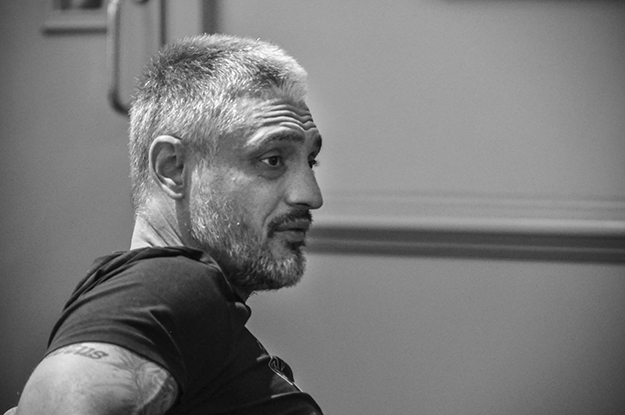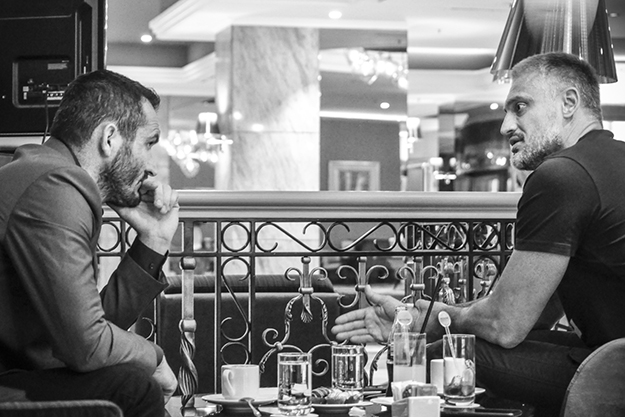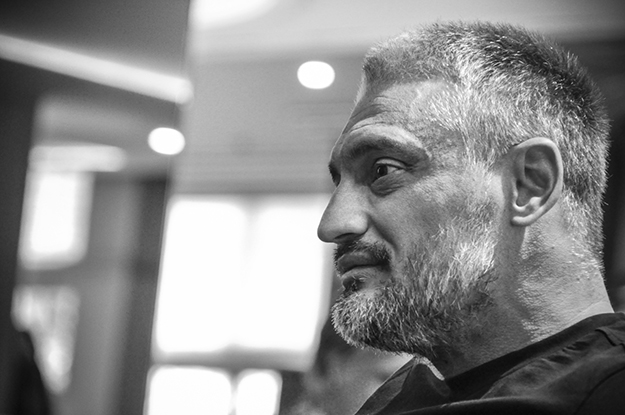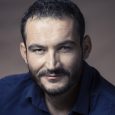Cedomir Jovanovic, the leader of Serbia’s Liberal Democratic Party, is now in his third decade of being actively engaged in politics. He was one of the leading figures of the 1996-97 student protests against Slobodan Milosevic. Later, in 1997, he became part of the Democratic Party, which was outspoken in its criticism of Milosevic; after Milosevic was overthrown in 2000, in what is known as the October 5 Revolution, Jovanovic was elected as a deputy.
Jovanovic’s political life had been full of troubles because of his beliefs, particularly his open support for Kosovo’s independence, and he has received death threats many times; in 2001, he survived an assassination attempt when a bomb was activated in his car.
A good friend of Zoran Djindic, Jovanovic’s eyes well up as he recalls the former prime minister’s words after he had also survived an assassination attempt in February 2003: “‘They don’t know how to kill us.’” Just a month later, Djindic would not be so lucky, as the pro-Western, progressive politician was shot dead.
“I don’t have a feeling that I am in politics, this is my way of life.”
Jovanovic is well known for his role in the negotiations in Milosevic’s home in 2001 that led to the Serb dictator being handed to the U.N. war crimes tribunal in the Hague. In 2005, after splitting from the Democratic Party, he established the Liberal Democratic Party.
However, the 47-year-old politician, who studied screenwriting at university, regrets that his family — he has three daughters and a son — have to suffer the consequences of his political involvement and beliefs.
“In Belgrade, I am never in the car with them, I am not in the streets with my kids, I never walk with them by the river,” he says.
“Sometimes I think I am a really bad parent because all my kids live with [the close-protection] of police. My son is 13 years old and he has a girlfriend. When he is going to the cinema he is going with police around him. He asks me, ‘Please, help me, I want to be alone with my girlfriend.’ When I say that there is no chance because, ‘You see, I am not alone either,’ he replies, ‘Yes but you were alone when you were 13…’”
However these circumstance have not caused Jovanovic to turn his back on politics, which he hesitates to distinguish from private life. “I don’t have a feeling that I am in politics, this is my way of life,” he says, sincerely, insisting that despite all of the inconveniences and downsides, he will continue to challenge conventional politics in Belgrade.

Photo: Boris Firicki.
K2.0 sat with Jovanovic for an in-depth interview where the liberal leader spoke of the past, reconciliation and the approach that Kosovo and Serbia should follow before joining the EU.
K2.0: I want to start with a general question about the threat to democracy and liberal values worldwide, and maybe your answer can be reduced to a more local level. What keeps you motivated to keep speaking of liberal values?
Cedomir Jovanovic: Because I am a human being. We have to work to keep up the changes and not give up, and of course I am an optimist because what is the other solution for me and for all of us? If we do not have the capacity to understand each other enough, for me this is not enough to send the message that we are alone. My duty is to give my best to find a common approach and to work for these ideas.
You’ve been in politics a long time, you were one of the leading figures of the 1996-97 student protest against Milosevic’s regime, and you were a close collaborator with prime minister Zoran Djindjic before he was assassinated. Have you ever been afraid due to the complex times that you have been through?
Of course I’ve been afraid but it was not always about my choice. It’s just the circumstances that I had to go through, and I don’t have the right to speak about this in my life.
Around me there are so many persons having bigger problems than mine. And for this is not gentle — to take care of my problems and ignore the problems of others. Yes, of course it’s a burden to be in my skin and it’s scary. I am full of scars from the past, but so what? My destiny is not something so different from that of the millions of citizens around me who have had a terrible life and that went through these problems. My life was still my choice.
One of the issues that you have been outspoken on is that of Kosovo.
You know what the truth is? We don’t know anything about Kosovo. I spent so much time in Kosovo. During the ’90s, I stayed with Fehmi Agani and I spoke with Azem Vllasi, Shkelzen Maliqi and Ibrahim Rugova. I wanted to understand Kosovo. I travelled and spent time there between February and April 1994 — I was there every year. I couldn’t understand what was happening there before visiting.
Before visiting it was like what was happening in Argentina or Pakistan. We were living together but we did not know each other because we were not in touch. I cannot understand even now how it is possible to be normal without any contact with Kosovo, with Albanians. Today we do not know anything about each other, about our families. We are total strangers.
And we talk about wanting to go to Europe when we do not know each other. We do not know Europe because we do not know ourselves… Indeed, the EU do not understand themselves.
"When I speak at the Assembly, deputies all go silent. I have no army behind me. I am alone, but my weapon is the truth."
Why are you a proponent of Kosovo’s independence? You have been a very rare voice in Serbian politics openly speaking of Kosovo’s right for independence. Why?
Because it is something true. A reality. How can I tell you otherwise when it is a reality? It wasn’t my goal. Believe me, I would be much happier with some other scenario — that we would live together in a multicultural multi-religious democracy. That we would share common values and behave differently with each other. But how is it my right in this situation to tell you something different, or to ignore the reality after what happened before and after the ’90s?
I was in Prishtina in 2005 and back then I said that Kosovo should be independent but do not make the same mistakes that we have. Don’t play the Serb role in the new reality. I told them, ‘Let’s speak about the character of Kosovo, is it a citizens’ state or a national state? Let’s speak about human rights, democracy and civic freedoms.’
Why do other politicians not share such thoughts in Serbia? And perhaps you have lost a lot of votes because of your stance toward Kosovo?
[Guido] Westerwelle, the former German foreign minister, once said to me, ‘Look man, you are crazy, with your ideas you would lose elections in Germany, let alone in Serbia.’ But I have no other way of thinking. I do not have the right to gamble with my way of thinking.
Today, maybe I don’t have 30 percent of the vote share in the elections, but where is Milosevic today? In 1989 he was a hero in Gazimestan. Where is Vojislav Kostunica today? Where is Boris Tadic today?
They are nowhere at this stage, but Vucic is here. He is closely associated with the past and he is dominating the political scene in Serbia. Why is he supported?
He is not being supported because of the Kosovo issue. He has support because in Serbia, like in other unhappy societies, citizens are always looking for a good excuse. Why? Because Kostunica was wrong, Tadic was wrong, then people like Vucic come and promise everything. This is the relationship between politicians and people that exists not only in Serbia.
The Serbs cannot understand when Vucic tells Serbs to vote for Thaci or Haradinaj. We are speaking of democracy in a world without democracy.
Let’s talk about the party that you lead ― the Liberal Democratic Party. Since it was established it has not won a large proportion of votes. Today, as we speak, you have only five deputies in the Serbian parliament out of 250 and you struggled to pass the threshold of five percent in the last elections. Why do you think Serbian society finds it difficult to embrace liberal values? Or perhaps you have not managed to persuade them of your beliefs?
Because this is not a question of opinion. When we speak for example about the EU, everybody in Serbia is for good salaries, August holidays, Manchester United vs. Chelsea games. If Europe is that, we are the best Europeans. But if we speak about the rule of law, strong institutions and reconciliation, actually my society has never had a chance to understand these terms and other topics. It’s our weakness. If we speak for Kosovo for example.
When I speak at the Assembly, deputies all go silent. I have no army behind me. I am alone, but my weapon is the truth.
"How is it possible to believe in peace after the wars of the ’90s if we have not responded to the question of why it all happened?"
But do you think you would get more votes if you would also use the term “Kosovo is Serbia”?
Today, no. Maybe some other politicians can but I cannot. But believe me, I am like a devil for them. And If I would pretend to become nationalist they would not believe me.
But, you know why I believe in Serbian society? Because, always under the skin, my society understands when it is wrong.
You mean regarding the Kosovo issue?
And our role there — that it’s wrong.
But why then is there no notable change in policies toward Kosovo?
Because the reality that we are living in is post-truth: ‘Kosovo is independent, so what? My choice is to live in big lies. Why should we live with the truth?’ This is the logic of Serbian politicians.
Every Serbian politician behind the camera tells me that I am right. Every citizen in Serbia today with a healthy logic tells you that I am right on this issue and in the end we just continue like that — losing time.
What is the truth of the past that you talk of?
We didn’t understand the changes. We always travelled with our own realities of the past. We established a national country at a time when we needed to establish a modern 20th century democracy. We live with a middle ages sense of Kosovo in our heads. We are speaking of monasteries and churches in Kosovo, but we aren’t a Christian society. We don’t have feeling and sense for life. How is it possible to speak, for example, about religion without any sense of life? For peace? Here it is our reality.

Photo: Boris Firicki.
In our minds there was always trouble. Vllasi was trouble. After Vllasi, Rugova was trouble. But sometimes you hear people say, ‘Vllasi was better than Rugova,’ ‘Rugova was better than Thaci,’ and today, ‘Thaci is better than Kurti.’ Tomorrow we do not know who will be better.
So you believe that it is difficult to build the future without having dealt with the past?
How is it possible to believe in peace after the wars of the ’90s if we have not responded to the question of why it all happened?
Thaci and Vucic do not have the time to speak about our past, what happened 100 years ago, 50 years ago, or what happened during the Milosevic period. Albin Kurti has the time, indeed.
But we heard Serbia’s president after the parliamentary elections in Kosovo arguing that he backed Serb List to support Hradinaj’s government because it was a better alternative than supporting Albin Kurti. How do you respond to that?
You know, Vucic said we need to vote Haradinaj because he’s a better choice than Albin Kurti. However, I’ve known Kurti for a longer time and I know he is better than the others.
Well, it’s politics, it’s politics. Of course he should deliver some explanations. Haradinaj is a war criminal according to our courts. Our court accuses him, and in the end Serb List votes for Haradinaj. Vucic has to play this role. Can you imagine if, when Haradinaj was arrested [in France] a couple of months ago, Vucic had said: ‘Ok, release him’?
"Vucic thinks he can talk of Kosovo as an open case. Kosovo is finished and we should think only how to help Kosovo and ourselves to move forward."
Sticking with Vucic for a moment — he does not attack you. I mean it doesn’t seem that you pose a threat as opposition to Vucic.
Because in some way he has respect towards me.
Why do you think so?
Sometimes, I am sure he cannot understand how for me it is so easy to support him in a situation.
Why do you need to support someone powerful like Vucic?
For example, when he pushed Serb List to vote for Haradinaj. I said it’s OK. They should do it.
But previously you said it is not a good idea. Isn’t it a bit contradictory?
No, for me it’s not a good idea to use Kosovo Serbs as a tool in politics, be it the international community, Haradinaj, Thaci.
How do you see the role of Serb List in Kosovo?
Serb List is an instrument of the government of Serbia. But it has an explanation: If you would say in Brussels that, ‘we do not have control over the Serbs in Kosovo, and they have their own democracy, and if you want to speak with them, speak with their representatives in Kosovo,’ they would tell you, ‘Don’t kid me.’ This is not a good solution.

Photo: Boris Firicki.
You [Kosovo] need Serbs in political life. It’s their responsibility to take care of their future. If we have control from Belgrade, they will never be integrated into Kosovar society. Where is our right to speak in their name? How can I be so courageous to take care of the Kosovar reality from Belgrade? I live in Belgrade, not in Prishtina, not Mitrovica, not Gracanica or in Strpce. How is it my right to talk of the privatization of Brezovica? They are just a tool and nothing less — it’s like in the Milosevic era.
With this approach, integration is impossible. [It’s as though] we cannot exist without enemies. Vucic keeps telling us about enemies rather than our goals. We should speak of our goals, not enemies. Vucic thinks he can talk of Kosovo as an open case. Kosovo is finished and we should think only how to help Kosovo and ourselves to move forward.
And Kosovar Serbs?
No, Kosovo — just Kosovo. If we are OK with Kosovo we are OK with Kosovo Serbs. If we only take care of Kosovo Serbs, actually we will only sacrifice them.
Your stance means that you do not support the Association of Serb Majority Municipalities in Kosovo. What’s your position on that?
No, I don’t support it because it’s a threat to Kosovo’s future. It is a sign that we are not able to live as citizens together in the future, but that we should be divided. We need Kosovo Serbs fully integrated. It is not easy and I know it, because our past is full of bloodshed. We should be more involved in building the peace. But we cannot be on the deadly train for eternity — to kill each other and to destroy each other.
Vucic argues that he is interested in protecting the rights and lives of Kosovo’s Serbs. How do you find this approach and how would you conduct policies towards Kosovo?
We have the duty but I cannot protect Serbs in Gracanica with ‘Putin-mix.’ I can protect only through cooperation with you Albanians. This is the difference in our approaches.
Why you are mentioning Putin in here?
It’s part of our spirit and our history — to find some answer to our inferiority. For example, there is some story about World War II, and a nice song, “Stojanka Majka Knezopoljka.” Mother is Stojanka, but more than mother Skender Kulanovic is singing about grandmother Russia. It’s in under our skin. All my older friends were saying that I should understand this narrative.
Are you fearful of Russian interference in the region?
Yes, of course. Because they want to use us and we are a perfect tool for a new mess in this part of Europe. They support the forces of the ’90s, of nationalism. They support [Milorad] Dodik and have a terrible approach towards Kosovo. For officials in Moscow, Kosovo is a criminal state. OK, probably in Kosovo we can face criminals that are the same in Moscow. But the idea is a criminal state is a shame. But behind it is to push us into a new war because any war in the Balkans is useful for Russia.
"If you want to be part of Uefa, be part of it. I want to play football with you. Better football than wars."
What would your alternative be if, hypothetically, tomorrow, you became prime minister of Serbia? How would you explain to the citizens of Serbia that ‘we have to recognize Kosovo’s independence’ after all these years of investment by different Serbian governments telling the people that Kosovo is still the cradle of Serbia.
I think we need to change the goals in Serbian society. It is important for me to explain to the EU that they should deliver more in the integration process. OK, give us a fast track to the EU and NATO.
On the other hand, it is not fair to expect that Serbian society will understand Kosovo’s independence. Of course, we cannot change the things like that that Milosevic used; one day committing the genocide in Srebrenica and the next day trying to build good neighborly relations with Alija Izetbegovic and Franjo Tudjman.
We should open the way for changes. One of the topics is Kosovo’s independence and the capacity to understand it.
Do you think Serbian society has the capacity to understand it? There have been wider attempts by Vucic lately to have a more inclusive approach regarding the issue of Kosovo.
Of course not, and I don’t believe in the idea that just like that we can understand Kosovo’s independence. It is not true because Serbs do not know anything about it. We do not understand what the goal of Serbian society is, not only on the issue of Kosovo, but in general. Of course, Kosovo is only one of our signs of our misunderstandings.
I did not get an explicit answer on the question on what you would do if you would become Serbia’s prime minister tomorrow.
I can understand it if we speak of our common interest. It is not fair to push my society to recognize Kosovo’s independence because it would trigger a conflict for the future…
So, according to my understanding, you would not push for recognition immediately. Is that right?
For me, I don’t have any right to put any ban on Kosovo. If you [Kosovo] want to become part of the U.N., OK, be part of the U.N. If you want to be part of Uefa, be part of it. I want to play football with you. Better football than wars. I am not happy that you are not part of UNESCO. For me, it’s a better idea that Kosovo is in UNESCO than in a black hole.
Our politicians are showing their muscles, telling us, ‘I have muscles to block them from being part of UNESCO.’ My idea is to work together on these issues. Let’s open the border and together open the prospects of European integration ― without any lies. This is not [even] a question for me.
But, why then do all the leaders such as Vucic and other Serbian politicians have the support of the EU, if they are blocking and obstructing good neighborly relations and applying the politics of the middle ages, as you referred to previously? Why, according to you, are they considered to be pro-European?
The EU has no idea what they are doing with us. Who — [Federica] Mogherini? Catherine Ashton? Who — [Jean-Claude] Juncker?
They have no plan with Kosovo, they don’t know what the plan is with Bosnia and Herzegovina. Like always. It’s the same problem as 100 years ago. We have problems in Macedonia, we have problems in Kosovo we have problems in Bosnia and Herzegovina. The EU does not know what it should do with itself. When I spoke some years ago with the European liberals [Alliance of Liberals and Democrats for Europe Party, ALDE], the common conclusion was, ‘Let’s speak of green energy.’ I told them, ‘You are crazy! You are speaking of green energy…’
… but green issues are also important. They need to be discussed, right?
Yes, green energy is important, that’s what [former UK Deputy Prime Minister] Nick Clegg told me. No, the problem is that we are losing the sense, even within the EU, of why the EU is important, and now, after some years, we see BREXIT. Because of that we have this stupid Nazi party in Germany, stupid ideas in Hungary, in Poland, and we have pure racism in the heart of Europe. We are losing the political struggle towards political movements such as Five Stars, Syriza, Podemos.
You asked me why the EU supports Vucic — because he tried to change something. OK, we have the Brussels Agreement and he agrees with everything that Brussels says.K





It's a shame Jovanovic did not continue to live full time in Kosovo. Kosovo is rep. Serbia only. Serbian.